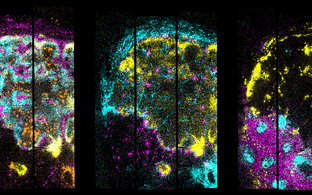
Hörnberg Lab
Molecular and cellular basis of behavior
Profile
Altered social behavior is a common symptom of several psychiatric and neurodevelopmental conditions, including autism spectrum disorders, major depressive disorders, and schizophrenia. These conditions are diverse, with different symptoms and underlying risk factors, some of which are shared between conditions.
We are interested in understanding how factors associated with these conditions alter brain regions that regulate social behaviors on the molecular and cellular level. We study this using mouse models and incorporate multiple approaches, including behavioral testing, biochemical experiments, and confocal imaging to identify the molecular mechanisms influencing these behaviors, and how changes in these mechanisms affect brain function and social interactions. Our long-term goal is to identify common biological pathways that can be used as diagnostic tools or treatment strategies.
Team
Research
Multidimensional behavioral analysis to understand the brain
All neurodevelopmental and psychiatric conditions are behaviorally defined, with highly variable symptoms that span multiple domains. Therefore, a major focus of the lab is to develop tools to quantify complex behaviors in freely-moving mice. We use a combination of home-cage phenotyping and deep-learning-based methods to screen mouse models for multiple phenotypes and quantify self-selected social interactions.
Regulation of synaptic translation
Several genes linked to monogenic forms of autism and other neurodevelopmental conditions directly affect synaptic function and translational regulation. Because of this, dysregulation in synaptic homeostasis has been proposed as a possible unifying mechanism underlying many symptoms associated with these conditions. We are interested in examining how the synaptic proteome homeostasis is altered in autism and other neuropsychiatric conditions, how this changes across the lifespan, and examining possible synapse-specific effects. We study this using a combination of genetic, biochemical, and omics technologies.
Mechanisms underlying vulnerability and resilience to stress and depression
Depression is among the most common mental health condition worldwide, with varied prognoses and poor responses to treatment. The lifetime prevalence is one in six, with almost two times more women affected than men. An important risk factor for depression is exposure to chronic stress, especially during childhood and adolescence. However, the most common response to stress is resilience in both humans and animals, with only a smaller proportion of people developing depression after stress. We are interested in understanding the cellular and molecular mechanisms underlying stress vulnerability with a focus on sex differences, using multidisciplinary techniques including spatial transcriptomic and proteomics, imaging, and extensive behavioral phenotyping.







